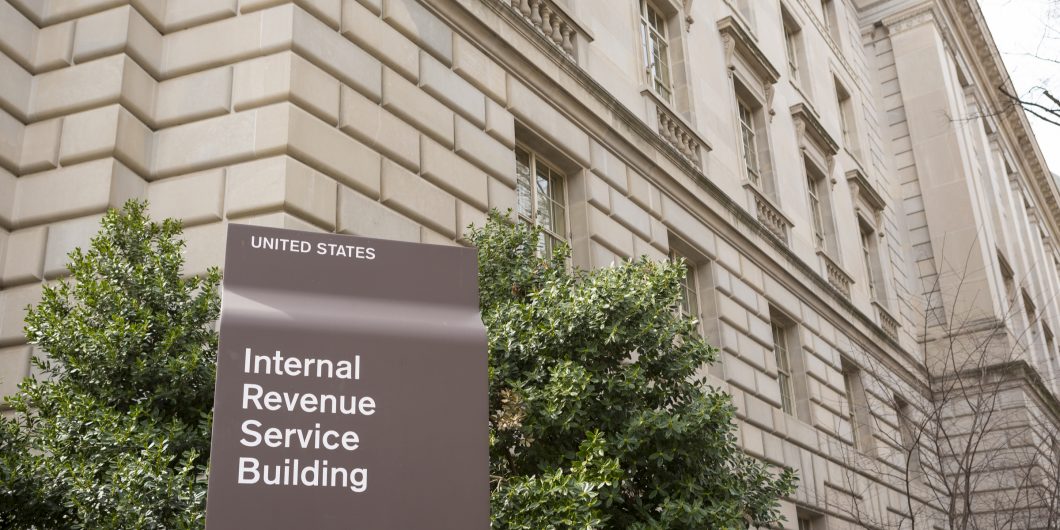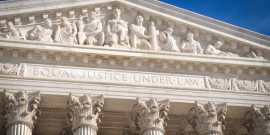New race- and gender-based programs raise constitutional questions about who is "socially and economically disadvantaged."
What's in Your Wallet?
To help foot the bill for the “Build Back Better” budget reconciliation bill—originally slated to cost $3.5 trillion—the Biden administration proposed an unprecedented measure for collecting revenue: conscripting banks and credit unions to help the IRS set up a financial profile for nearly everyone in America.
In a May list of proposals for raising revenue, the Biden Treasury Department laid out a plan to force financial institutions—including banks, credit unions, brokerages, and payment apps such as Venmo—to calculate and report to the IRS the gross inflows and outflows of every account with annual transactions totaling $600. When this proposal received pushback from banks and credit unions of all sizes and individuals concerned about privacy, the administration and prominent Democrats such as House Speaker Nancy Pelosi (D-CA) and Sen. Elizabeth Warren (D-MA) defended it as a means of targeting the wealthy. In a letter defending the proposal to Congress, Treasury Secretary Janet Yellen wrote, “For certain income streams that accrue disproportionately to upper-income households, there is no information available to the IRS from third parties presently.”
Given the obvious fact that $600 in a bank account does not make someone wealthy, Democratic leaders sent signals in mid-October that they would modify the threshold to $10,000. But that would still leave the IRS free to financially profile a vast swath of Americans who are not wealthy.
As Reason’s Matt Welch points out:
Ten grand is about how much you make working full-time in New York City on the minimum wage for four months, for eight months at the federal rate. It’s the average annual rent in West Virginia (the least expensive in the country), and less than half the average price paid for used vehicles in 2020. What $10,000—let alone $600—most decidedly is not is the preferred level of annual transactions among the tax-avoidant rich.
And there is no evidence the “tax-avoidant rich” evade taxes by opening small accounts at multiple financial institutions. As my Competitive Enterprise Institute colleague Robert Carter, a former tax attorney and state tax prosecutor, has written, “The 1 percent simply aren’t disguising income by dispersing it through a vast network of accounts with a scant $50 of activity per month.”
The proposal also seems poorly designed to catch criminals, who routinely use pseudonyms and fake Social Security numbers or avoid the banking system altogether. In fact, the only purpose of the proposal seems to be to ease surveillance on generally law-abiding citizens in whom government bureaucrats, for whatever reason, suddenly take an interest. A search of the database that would be created could lead to bank account info at the touch of a button for interested bureaucrats.
Yellen and the proposal’s backers note that it does not require financial institutions to automatically submit transaction-level data on specific purchases. But it’s a fair bet to say that IRS officials having such info at their fingertips will lead to more—and more extensive—searches, and there is nothing in the proposal that would curb the government’s ability to conduct those. Recent data breaches and misuses of sensitive taxpayer information, such as the leak of the files of wealthy Americans to the news site Propublica, do not inspire confidence that the IRS will keep this personal financial data confidential and secure.
What’s more, the mandated calculation and reporting of nearly every depositor’s total inflows and outflows would impose a crushing compliance burden on community banks and small credit unions. The Independent Community Bankers of America (ICBA) states that the proposal “would create a costly and complex new reporting burden for community banks that already carry significant data collection and reporting obligations for the federal government, effectively acting as uncompensated agents of the government.” The ICBA adds that small banks could be penalized “for inadvertent errors” such as account ownership changes from marriage, divorce, and individuals being added to accounts.
Similarly, the Credit Union National Association (CUNA), which represents most of the nation’s credit unions, also warns of a large “new compliance burden.” CUNA President and CEO Jim Nussle writes in a July letter to the Senate:
Smaller credit unions would be especially burdened by this new proposal. From the increased costs of software upgrades to staff training, smaller institutions would perhaps need financial resources and additional time for implementation to meet new requirements.
Bank and credit union officials, along with other critics of the proposal, also warn that it could contribute to the problem of marginalized and low-income Americans not accessing the banking system, because of both new privacy concerns and compliance costs that force banks to raise fees or impose new ones.
Instead of new ill-conceived information collection mandates that subvert the spirit of the Fourth Amendment, we should consider ways to root out existing laws and regulations that effectively turn banks and credit unions into spies against ordinary American consumers.
In his letter, Nussle points to the requirements of the Foreign Account Tax Compliance Act of 2010, or FATCA, which imposed extensive mandates on foreign banks and foreign branches of U.S. banks to collect detailed information on their customers. He notes, “In response, many Americans overseas were unable to obtain or lost access to the banking system as many financial institutions were unwilling or unable to meet the requirements of that law.”
Banks and credit unions are already required to collect and submit a great deal of information on customers to the IRS and other agencies, and some proponents of the proposal point to this fact as a justification. But as Mercatus Center fellows Brian Knight and Thomas Hoenig (the latter of whom is the former president of the Federal Reserve Bank of Kansas City) write in The Hill, that fact “is more an indictment of the status quo than a justification for compounding the error.”
Among the snooping and reporting mandates banks are currently forced to comply with are “currency transaction reports” and “suspicious activity reports,” with the justification that they are needed to prevent a wide array of crimes, from tax evasion to illegal drug dealing to terrorism. Since the 1970s, the Bank Secrecy Act (BSA) has required banks, subject to some exemptions, to file a “currency transaction report” (CTR) on every cash transfer of $10,000 or more.
While reporting on single transactions that meet or exceed $10,000 is less intrusive than reporting on every account that totals $10,000, as the Treasury Department is currently proposing, it still casts a dragnet over many legitimate deposits and withdrawals. For instance, a small entrepreneur could gross $10,000 or more during a good period and deposit a single check for that amount at the bank. A 2016 Heritage Foundation report noted that, adjusted for inflation, $10,000 at the time the Bank Secrecy Act was enacted in the 1970s was worth $60,000 in 2015 dollars.
In the 1990s, the Treasury Department expanded BSA regulations to require banks to file “suspicious activity reports” on all transactions of $5,000 or more if they have “no apparent lawful purpose or are not the sort in which the particular customer would normally be expected to engage.”
Both conservatives and liberals have complained at various times, over the past two decades, that both suspicious activity reports and CTRs effectively draft banks as spies for the government, which both compromises privacy and puts a costly burden on financial institutions that is passed on to consumers. Civil and economic libertarians have made this point consistently, arguing that these mandates are unconstitutional. As I noted in a Reason cover story I wrote in 2003, “the Bank Secrecy Act should be thought of as a 30-year experiment in subverting the Fourth Amendment.”
When lawsuits were filed challenging the BSA’s constitutionality in the early 1970s, Supreme Court Justice William Douglas called the forced snooping a clear violation against the Fourth Amendment’s guarantees against “unreasonable searches and seizures.” Douglas, a New Deal progressive appointed to the court by President Franklin Roosevelt, wrote in California Bankers Association v. Shultz (1974):
Under the act and regulations the reports go forward to the investigative or prosecuting agency…without notice to the customer. Delivery of the records without the requisite hearing of probable cause breaches the Fourth Amendment. …
I am not yet ready to agree that America is so possessed with evil that we must level all constitutional barriers to give our civil authorities the tools to catch criminals.
Unfortunately, Douglas was in the dissenting minority. The majority opinion upheld the mandates, citing New Deal precedents that gave short shrift to Fourth Amendment objections to searches of businesses. The Court also reasoned that a bank’s customers generally lack standing to challenge the law because they “voluntarily” give their financial information to the banks.
The reasoning in this and in subsequent cases has come to be called the “third-party doctrine,” and has been used by law enforcement, including the Biden Treasury Department, as an end-run around the Fourth Amendment whenever the government wants voluminous information without going to the trouble of getting a warrant.
The good news is that, in recent years, the Supreme Court has signaled its willingness to reexamine the third-party doctrine. In Carpenter v. United States (2018), the Court ruled that the doctrine has its limits, particularly when consumers expect that the data will be kept private. As the Court stated, “this Court has never held that the Government may subpoena third parties for records in which the suspect has a reasonable expectation of privacy.”
Also arguing against the Biden proposal, and other extensive information collecting requirements, is the fact that agencies are already flooded with paperwork and can’t sift through the data to find the true lawbreakers. This is particularly true of the IRS. As my colleague Carter writes, “IRS employees are already at the breaking point as they struggle to use the data they currently collect.”
Yet even though the IRS surveillance measure was absent from the “Build Back Better” plan the House passed November 19 on a party-line vote, the Biden administration and some lawmakers are still pushing to reinsert it into the final legislation. Natasha Sarin, deputy assistant secretary for Economic Policy at the Treasury Department, said during a panel at the liberal Center for American Progress that she was still “hopeful” about the provision being included. “There’s a very committed group of senators trying to get this past the finish line,” she said.
Instead of new ill-conceived information collection mandates that subvert the spirit of the Fourth Amendment, we should consider ways to root out existing laws and regulations that effectively turn banks and credit unions into spies against ordinary American consumers. That would go a long way toward restoring trust in the American financial system.



